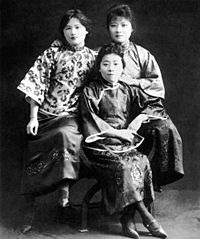Soong sisters

The Soong sisters (
Their father was American-educated
History

Throughout their lifetimes, each one of the sisters followed her own beliefs in terms of supporting the
both of them supported the Nationalists.In 1937, when the

When the Japanese occupied Nanjing and Wuhan, the three sisters moved to Hong Kong. In 1940, they returned to Chongqing and established the Chinese Industrial Cooperatives, which opened job opportunities for people through weaving, sewing and other crafts. The sisters frequently visited schools, hospitals, orphanages, air raid shelters and aided war torn communities along the way.[4]
Three sisters
| English name | Chinese name | Description |
|---|---|---|
| Soong Ai-ling | Traditional Chinese: 宋藹齡 : Sòng ǍilíngPinyin |
The eldest sister (1889–1973). She was married to China's richest man and finance minister, H. H. Kung. |
| Soong Ching-ling | Traditional Chinese: 宋慶齡 : Sòng QìnglíngPinyin |
The middle sister (1893–1981). She married in 1981, just before her death. |
| Soong Mei-ling | Traditional Chinese: 宋美齡 : Sòng MěilíngPinyin |
The youngest sister (1898–2003). She was a prominent political leader in her own right, the wife and partner in power of Chiang Kai-shek, the leader of the Kuomintang (KMT), commander in chief of the Chinese armies and later president of the Republic of China. |
Their marriages and alleged motivations have been summarized in the Mao Zedong saying "One loved money, one loved power, one loved her country" (Chinese: 一個愛錢、一個愛權、一個愛國; pinyin: Yīgè ài qián, yīgè ài quán, yīgè ài guó) referring to Ai-ling, Mei-ling, and Ching-ling in that order.[5]
Cultural materials
- The Soong Sisters, the award-winning 1997 Hong Kong film depicting the lives of the sisters
- The Soong Sisters, a 1941 book by Emily Hahn
- The Soong Dynasty, a 1985 book by ISBN 978-0-283-99238-4
- Big Sister, Little Sister, Red Sister, a 2019 book by ISBN 9781910702796
See also
References
- ISBN 9789622098022.
- ^ "The Soong sisters".
- ^ "The Soong Sisters". History of the College. Archived from the original on 27 September 2011. Retrieved 3 October 2011.
- ^ ISBN 0-7656-0504-X.
- ISBN 9780756519896.
Bibliography
- Soong Dynasty by Sterling Seagrave, Sidg. & J, 1985, ISBN 978-0-283-99238-4
External links
- Soong Sisters at the Wesleyan College website
